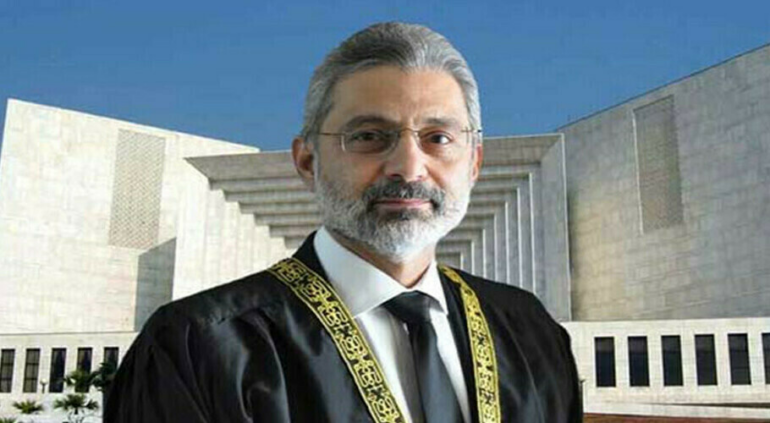In a significant development, Justice Qazi Faez Isa, the senior judge of Supreme Court heading a three-member judicial commission tasked with investigating alleged audio leaks on social media, has adjourned the commission’s proceedings indefinitely.
The decision came a day after the Chief Justice of Pakistan, Umar Ata Bandial, and a Supreme Court bench instructed the commission to halt its work.
The federal government had formed the commission on May 20 to address concerns surrounding the judiciary’s independence raised by the leaked audio recordings. Justice Isa led the commission, along with Chief Justice Naeem Akhtar Afghan of the Balochistan High Court and Chief Justice Aamer Farooq of the Islamabad High Court.
On Friday, the Supreme Court intervened by staying the commission’s proceedings, suspending the government’s appointment notification from May 19, and halting the implementation of the commission’s order to conduct open hearings and disclose its findings.
During the latest hearing, Justice Isa referred to the Supreme Court’s “judicial order” and adjourned the meeting accordingly. A written order detailing the proceedings was subsequently issued.
According to the written order, Attorney General for Pakistan, Mansoor Usman Awan, was asked to read out the Supreme Court’s order from the previous day. When questioned, Awan confirmed that the inquiry commission was listed as respondent No. 2 in Constitution petitions No. 14 and 15/2023.
Based on this order, the proceedings of the commission were adjourned, as stated in today’s order.
During the hearing, Justice Isa requested a copy of the court order and received it from the Attorney General.
After reviewing the verdict, Justice Isa questioned why the commission’s work was stopped when it had not been officially notified about the hearing. He also inquired whether a notice had been issued or if the Attorney General had been present without prior notice.
The Attorney General explained that he was verbally informed about the court appearance and received a notice after the hearing.
Justice Isa then highlighted the Supreme Court’s rules, which require an order to be issued after hearing the respondents.
He noted that none of the petitioners had sent a notice to the commission and expressed surprise that they were absent from the proceedings while holding a press conference outside the court.
Justice Isa further questioned why the Attorney General did not inform the court that the commission was not conducting investigations under Article 209 (Supreme Judicial Council) of the Constitution.
The judge stressed that the commission was established under the Commission of Inquiry Act, 1956, and emphasized the importance of upholding the Supreme Court’s orders.
Amid the proceedings, Justice Isa expressed disappointment with the legal profession, noting that blaming judges had become an easy course of action. He questioned the obstruction of truth and highlighted the need for lawyers to follow their code of conduct. The judge also discussed the issue of privacy and the role of CCTV cameras in capturing evidence.
Ultimately, Justice Isa concluded that the commission could not proceed further due to the Supreme Court’s judicial order. He apologized to the witnesses and announced that a written order would be issued.



